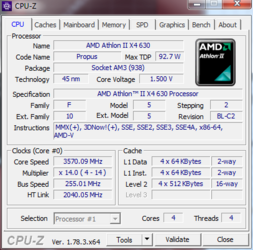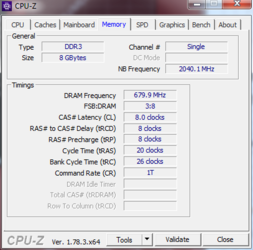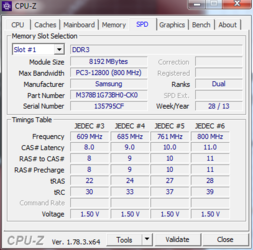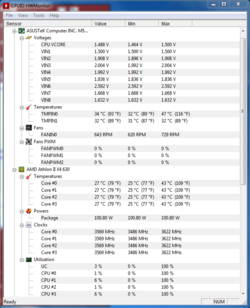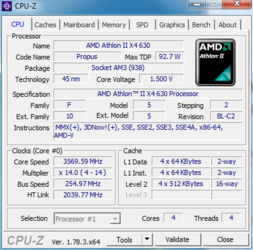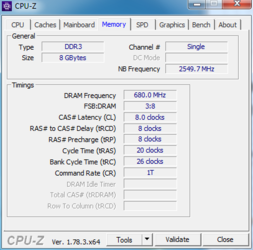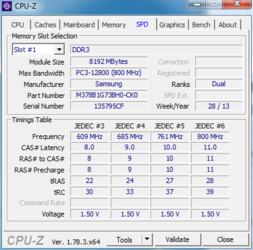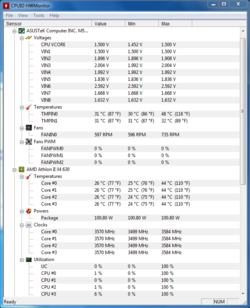-
Welcome to Overclockers Forums! Join us to reply in threads, receive reduced ads, and to customize your site experience!
You are using an out of date browser. It may not display this or other websites correctly.
You should upgrade or use an alternative browser.
You should upgrade or use an alternative browser.
[HELP] Overclocking Athlon II X4 630
- Thread starter pcwhockey18
- Start date
OP
- Joined
- Apr 3, 2017
- Thread Starter
- #45
I am at about 2400 mhz, and have not been successful with any long test. If I dial back the FSB should I dial back the voltage and frequency on the CPU/NB?
- - - Updated - - -
I know earlier you said I can have the voltage up to 1.35 which I have not even come close to. But I do not know if that will fix my problem.
- - - Updated - - -
I know earlier you said I can have the voltage up to 1.35 which I have not even come close to. But I do not know if that will fix my problem.
- Joined
- Dec 27, 2008
Here's the best way. Put the CPU/NB at the stock 2000 mhz with 1.225 volts. It will be stable there for sure. But do the long test anyway. If still unstable the problem is not the CPU/NB the problem is core stability. Then just work only with the CPU core frequency and voltage. Start where you are an work backwards if necessary.
- Joined
- Dec 27, 2008
Is 40 minutes a longer time than before?
Go back to a FSB of 250 mhz and a vcore of 1.425. CPU/NB of 2200 at 1.225. I think you passed the short test at a little less vcore than that with the CPU/Nb at 2500 and 1.225. We need to find a stable baseline overclock on the long test and go from there. I'm thinking your motherboard electronics may not be able to handle 1.5 vcore.
I edited this so read it again
Go back to a FSB of 250 mhz and a vcore of 1.425. CPU/NB of 2200 at 1.225. I think you passed the short test at a little less vcore than that with the CPU/Nb at 2500 and 1.225. We need to find a stable baseline overclock on the long test and go from there. I'm thinking your motherboard electronics may not be able to handle 1.5 vcore.
I edited this so read it again
Last edited:
OP
- Joined
- Apr 3, 2017
- Thread Starter
- #51
Just read the edit, the test is still running, its been an hour and a half. I believe I am at 255mhz on the FSB with the vcore at 1.500 volts. CPU/NB at 2000 with 1.225 volts. Should I stop the test and reconfigure? Or let it do its thing, and if it fails change the settings?
- Joined
- Dec 27, 2008
No, don't stop it. If you pass it then you have a baseline you can work from. This new information from suggests the failures were not caused by the CPU/NB but by the cores. You failed after 40 minutes with the CPU/NB settings where they are now but a FSB of 260 mhz. When you backed it off to 255 then you could run the stress test longer. Do you follow my logic? Once we get the cores stable we can work on bumping up the CPU/NB frequency.
- Joined
- Dec 27, 2008
So we now know the limit of your CPU core frequency at safe voltages.
Let's see if we can squeeze some more out of the CPU/NB. Increase the CPU/NB by 1x increment (the CPU/NB multiplier, that is) and retest with a long test. It's getting kind of late so if you want just do it tomorrow.
Let's see if we can squeeze some more out of the CPU/NB. Increase the CPU/NB by 1x increment (the CPU/NB multiplier, that is) and retest with a long test. It's getting kind of late so if you want just do it tomorrow.
- Joined
- Dec 27, 2008
Good job! I think you have squeezed about all you are going to squeeze out of that old boy.
I don't have any more suggestions. You have been a good pupil and I hope what you have experienced with this will be of help in the future. One area of new learning and experience generally leads to others.
I don't have any more suggestions. You have been a good pupil and I hope what you have experienced with this will be of help in the future. One area of new learning and experience generally leads to others.
Similar threads
- Replies
- 13
- Views
- 898
- Replies
- 24
- Views
- 5K
- Replies
- 2
- Views
- 1K
